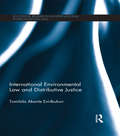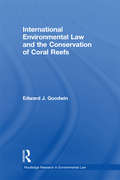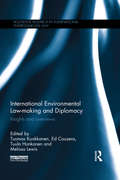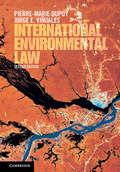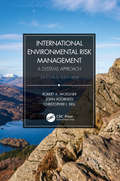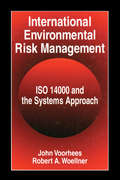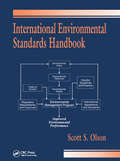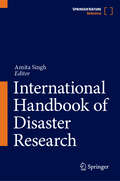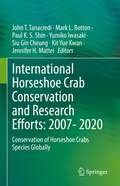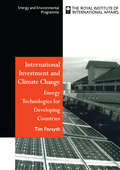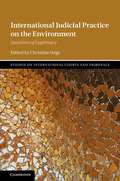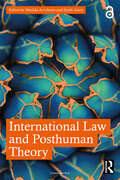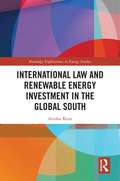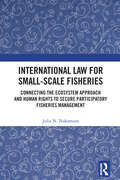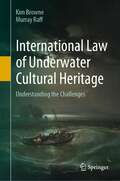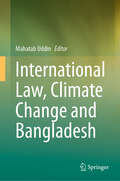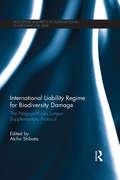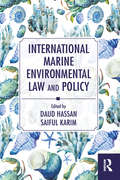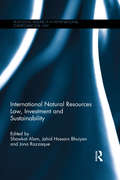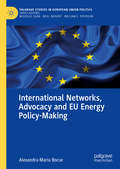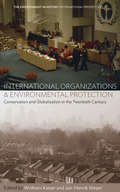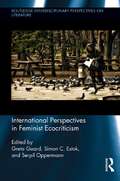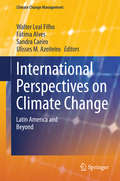- Table View
- List View
International Environmental Law and Distributive Justice: The Equitable Distribution of CDM Projects under the Kyoto Protocol (Routledge Research in International Environmental Law)
by Tomilola Akanle Eni-IbukunThe Clean Development Mechanism (CDM) is widely regarded as one of the Kyoto Protocol’s best creations and as an essential part of the international climate change regime. The CDM has been constantly evolving to ensure that it fulfils its objectives of mitigating climate change and contributing to sustainable development in developing countries. The over 6,000 registered projects under the CDM are estimated to have generated almost US$200 billion of investment in developing countries and are expected to achieve GHG emission reductions of about 6.8 billion tonnes. Nevertheless, the CDM is not perfect, and one of its main problems is the inequitable geographic distribution of projects among developing countries. Understandably, this is a problem that countries are very keen to address, and since 2001, even before the first project was registered, countries have been highlighting the need to ensure that projects are equitably distributed among participating countries. This book looks at distributive justice under the CDM regime and focuses on the issue of equity in the geographic distribution of CDM projects among developing countries. The book investigates relevant aspects of international law to identify the legal characteristics of equitable distribution or distributive justice, in order to establish what equitable distribution in the CDM should look like. Based on these investigations, Tomilola Akanle Eni-Ibukun breaks new ground in defining equitable distribution under the CDM and exploring how key obstructions to the equitable distribution of projects may be overcome. The book will be of particular interest to academics and policymakers of climate change and the CDM within international law.
International Environmental Law and the Conservation of Coral Reefs (Routledge Research in International Environmental Law)
by Edward J. GoodwinTropical coral reefs are important ecosystems. They are economically important to coastal communities living in predominantly developing countries, and also provide shoreline protection, catalyse land formation enabling human habitation, act as a carbon sink and are a repository for genetic and species diversity rivalling rainforests. In the face of mounting man-made pressure from pollution, climate change and over-exploitation, these ecosystems increasingly need action to be taken to ensure their conservation and long term sustainable development. International Environmental Law and the Conservation of Coral Reefs breaks new ground by providing the first in-depth account of the ways in which multilateral environmental treaty regimes are seeking to encourage and improve the conservation of tropical coral reef ecosystems. In so doing, the work aims to raise the profile of such activities in order to reinforce their status on the environmental agenda. The book also has wider implications for international environmental law, arguing that sectorial legal action, provided it remains co-ordinated through a global forum that recognises and reflects the inter-connections between all elements of the natural environment, is the most effective way for international law to enhance the conservation of certain habitats. This book will be invaluable to environmental lawyers, legal researchers, marine conservationists and other stakeholders in coral reefs.
International Environmental Law and the Global South
by Alam, Shawkat and Atapattu, Sumudu and Gonzalez, Carmen G. and Razzaque, Jona Shawkat Alam Sumudu Atapattu Carmen G. Gonzalez Jona RazzaqueThe unprecedented degradation of the planet's vital ecosystems is among the most pressing issues confronting the international community. Despite the proliferation of legal instruments to combat environmental problems, conflicts between rich and poor nations (the North-South divide) have compromised international environmental law, leading to deadlocks in environmental treaty negotiations and noncompliance with existing agreements. This volume examines both the historical origins of the North-South divide in European colonialism as well as its contemporary manifestations in a range of issues including food justice, energy justice, indigenous rights, trade, investment, extractive industries, human rights, land grabs, hazardous waste, and climate change. Born out of the recognition that global inequality and profligate consumerism present threats to a sustainable planet, this book makes a unique contribution to international environmental law by emphasizing the priorities and perspectives of the global South.
International Environmental Law-making and Diplomacy: Insights and Overviews (Routledge Research in International Environmental Law)
by Tuomas Kuokkanen Ed Couzens Tuula Honkonen Melissa LewisBringing together contributions from diplomats, UN agency officials, lawyers and academics, this book provides insight into the evolution of international environmental law, diplomacy and negotiating techniques. Based on first-hand experiences and extensive research, the chapters offer a blend of practice and theory, history and analysis, presenting a range of historical episodes and nuances and drawing lessons for future improvements to the processes of law-making and diplomacy. The book represents a synthesis of the most important messages to emerge from the annual course on Multilateral Environmental Agreements, delivered to diplomats and negotiators from around the world for the last decade by the University of Eastern Finland and the United Nations Environment Programme. The book will be of interest as a guide for negotiators and as a supplementary textbook and a reference volume for a wide range of students of law and environmental issues.
International Environmental Law: An Introduction
by Jorge E. Viñuales Pierre-Marie DupuyInternational Environmental Law offers a concise, conceptually clear, and legally rigorous introduction to contemporary international environmental law and practice. The book covers all major environmental agreements, paying particular attention to their underlying structure, main legal provisions, and practical operation. It blends legal and policy analysis, making extensive reference to the jurisprudence and scholarship, and addressing the interconnections with other areas of international law, including human rights, humanitarian law, trade and foreign investment. The material is structured into four sections - foundations, substantive regulation, implementation, and influence on other areas of international law - which help the reader to navigate the different areas of international environmental law. Each chapter includes charts summarising the main components of the relevant legal frameworks and provides a detailed bibliography. Suitable for practicing and academic international lawyers who want an accessible, up-to-date introduction to contemporary international environmental law, as well as non-lawyers seeking a concise and clear understanding of the subject.
International Environmental Risk Management: A Systems Approach
by John Voorhees Robert A. Woellner Christopher L. BellBased on the first edition with extensive analysis of practical applications of environmental risk management and compliance management systems, this second edition of International Environmental Risk Management reflects updates made in the understanding and application of risk management best practices and makes available a frame of reference and systematic approach to environmental and social governance (ESG). It provides a pathway for readers to implement environmental management strategies that can be integrated with core operations and other risk management efforts, including supporting sustainability and corporate social responsibility initiatives associated with climate change, the circular economy or supply chain conditions, as well as enterprise risk management; anti-bribery, and other compliance management systems. This book provides in-depth discussions of ways to use global environmental management standards. New features in this edition: Combines EMS standards with discussion of specific principles, other authors’ research, and guidelines on management practices. Provides guidelines on how to prepare for, anticipate, and resolve environmental issues. Includes easily understandable information for all readers and is not simply aimed toward individuals who are knowledgeable about this topic. Provides in-depth discussions on using global environmental management standards to manage risk and promote resilience, as well as legal strategies and voluntary initiatives that companies can utilize to minimize risk. Accounts for the substantive revisions in ISO 14001:2015. As a growing and rapidly changing field, it is necessary to address new issues, guidelines, and regulations to assist businesses, academia, students, consultants, lawyers, and environmental managers with a pragmatic resolution to environmental risk management issues. This second edition gives a broad and detailed analysis of the changes made to international standards and practices and serves as an excellent guide to managing environmental risk.
International Environmental Risk Management: ISO 14000 and the Systems Approach
by John Voorhees Robert A. WoellnerInternational Environmental Risk Management: ISO 14000 and the Systems Approach gives readers an extensive analysis of practical applications of ISO 14000 and environmental compliance management systems. It offers a mixture of technical engineering advice, legal guidance, and common-sense business acumen. The authors explain the essentials of the standards - how they are being developed and what implications they present - and then discuss cost-benefit analyses, integration strategies, business risk control measures, litigation avoidance and legal expense reduction, and step-by-step guidance on achieving third-party certification.
International Environmental Standards Handbook
by Scott S. OlsonLack of knowledge about, and noncompliance with, international standards can result in loss of sales and partnership opportunities as well as possible legal action. The International Environmental Standards Handbook provides the necessary historical background to understand the current status of international environmental standards. It contains copies of available treaties and provides coverage of laws and standards. The book offers strategies for designing and implementing environmental systems that will be internationally accepted. It includes a list of information sources and a directory of international environmental organizations.
International Handbook of Disaster Research
by Amita SinghThis handbook is a comprehensive source of information, analysis and directions in disaster studies. It goes beyond the oft-explored issues of management and science related to the topic and explores policies, governance, law and decision-making combined with the processes of implementation and enforcement, all the while integrating the latest science and technology updates related to the topic, such as artificial intelligence and early warning systems. It brings together studies which relate to sociology, politics and institutional economics, which work under the impact of resource availability, issues of leadership and international laws. Disasters are trans-boundary and disaster studies are trans-disciplinary. It is this aspect which would form the fulcrum of contributions and present a new, refreshing and innovative design for the handbook. The transformatory pedagogy which started with the Hyogo Framework for action 2005-2015 and The Sendai Framework for Disaster Risk Reduction 2015-2030 outlines seven clear targets and four priorities for action to prevent new and reduce existing disaster risks. The four priority areas around which the book would revolve are (i) Understanding disaster risk; (ii) Strengthening disaster risk governance to manage disaster risk; (iii) Investing in disaster reduction for resilience and; (iv) Enhancing disaster preparedness for effective response, and to "Build Back Better" in recovery, rehabilitation and reconstruction.
International Horseshoe Crab Conservation and Research Efforts: Conservation of Horseshoe Crabs Species Globally
by Mark L. Botton John T. Tanacredi Siu Gin Cheung Paul K. S. Shin Yumiko Iwasaki Kit Yue Kwan Jennifer H. MatteiThe first International Conference on Horseshoe Crab’s Conservation conducted at Dowling College, USA, (2007) and it’s proceedings published by Springer in 2009, prompted the continued research and conservation efforts presented at subsequent conferences and colloquium in Hong Kong, Taiwan, (2011); San Diego, CA, (2014), (CERF); Japan, Sasebo (2015) and an accepted inclusion for a special session on Horseshoe Crabs at the 2017 CERF Conference held in Providence, RI, USA. All these aforementioned conferences contributed manuscripts, posters, workshop “position papers”, and oral presentations the majority of which have not been published in total. In 2015, Carmichael et al. had published by Springer the majority of manuscripts from the 2011 Hong Kong / Taiwan conference. However, workshop results and all subsequent presentations and workshops were not. The Japan conference presented over 40 papers alone. A collection of all workshop summaries, poster presentations and new manuscript submittals (San Diego, CA; Sasebo, Japan; and Providence, RI) as well as products prepared for the IUCN World Congress in Hawaii, (2016), are included potential contributions for review in this compilation now available for global distribution in this Springer Nature publication.The “Proceedings of International Conferences on the Biology and Conservation of Horseshoe Crabs”, thus contains over 50 manuscripts and a diversified collection of documents, photos and memorabilia covering all four of the horseshoe crab species globally: their biology, ecology evolution, educational, and societal importance. This book exposes the impacts that humans have imposed on all four of these species, revealing through the coordinated effort of horseshoe crab scientists with the IUCN, of the worldwide need for a clear conservative effort to protect these paleo- survival organisms from a looming extinction event. Biologists, conservationists, educators, and health professionals will all welcome this book not only for exploration of its pharmacological interest, but also for the mystery of their longevity. This book also clarifies the future research needs and the conservation agenda for the species worldwide. Anyone working or studying estuaries on a global scale, will need to obtain this seminal work on horseshoe crabs.
International Investment and Climate Change: Energy Technologies for Developing Countries
by Timothy ForsythThis study, based on fieldwork and case studies of southeast Asian countries shows how privatization, investment and new energy technologies can be integrated to combat climate change and provide the maximum return for investors. The author explains what incentives and regulatory structures are needed that do not damage local competitiveness. Asserting that technology transfer is fundamental to effective policies for climate change and for economic development, the text examines how the benefits can be maximized.
International Judicial Practice on the Environment: Questions of Legitimacy (Studies on International Courts and Tribunals)
by Christina VoigtMore and more environmental cases are being heard and decided by international courts and tribunals which lack special environmental competence. This situation raises fundamental questions of legitimacy of the environmental practice of international courts. This book addresses inter alia questions of who has legal standing to bring an environmental claim before an international court, on which legal norms is the case decided and whether judges have the necessary expertise to adjudicate environmental cases of often complex nature. It analyses which challenges international courts face, which possibilities they have and which advances international judicial practice has been able to make in protecting the environment. Through the prism of legitimacy important insights emerge as to whether international courts and tribunals are fit for addressing some of the most pressing global challenges of our time.
International Law and Posthuman Theory
by Emily Jones Matilda ArvidssonAssembling a series of voices from across the field, this book demonstrates how posthuman theory can be employed to better understand and tackle some of the challenges faced by contemporary international law. With the vast environmental devastation being caused by climate change, the increasing use of artificial intelligence by international legal actors and the need for international law to face up to its colonial past, international law needs to change. But in regulating and preserving a stable global order in which states act as its main subjects, the traditional sources of international law – international legal statutes, customary international law, historical precedents and general principles of law – create a framework that slows down its capacity to act on contemporary challenges, and to imagine futures yet to come. In response, this collection maintains that posthuman theory can be used to better address the challenges faced by contemporary international law. Covering a wide array of contemporary topics – including environmental law, the law of the sea, colonialism, human rights, conflict and the impact of science and technology – it is the first book to bring new and emerging research on posthuman theory and international law together into one volume. This book’s posthuman engagement with central international legal debates, prefaced by the leading scholar in the field of posthuman theory, provides a perfect resource for students and scholars in international law, as well as critical and socio-legal theorists and others with interests in posthuman thought, technology, colonialism and ecology.
International Law and Posthuman Theory
by Emily Jones Matilda ArvidssonAssembling a series of voices from across the field, this book demonstrates how posthuman theory can be employed to better understand and tackle some of the challenges faced by contemporary international law.With the vast environmental devastation being caused by climate change, the increasing use of artificial intelligence by international legal actors and the need for international law to face up to its colonial past, international law needs to change. But in regulating and preserving a stable global order in which states act as its main subjects, the traditional sources of international law – international legal statutes, customary international law, historical precedents and general principles of law – create a framework that slows down its capacity to act on contemporary challenges, and to imagine futures yet to come. In response, this collection maintains that posthuman theory can be used to better address the challenges faced by contemporary international law. Covering a wide array of contemporary topics – including environmental law, the law of the sea, colonialism, human rights, conflict and the impact of science and technology – it is the first book to bring new and emerging research on posthuman theory and international law together into one volume.This book’s posthuman engagement with central international legal debates, prefaced by the leading scholar in the field of posthuman theory, provides a perfect resource for students and scholars in international law, as well as critical and socio-legal theorists and others with interests in posthuman thought, technology, colonialism and ecology.Chapters 1, 9 and 11 of this book is freely available as a downloadable Open Access PDF at http://www.taylorfrancis.com under a Creative Commons Attribution-Non Commercial-No Derivatives (CC-BY-NC-ND) 4.0 license.
International Law and Renewable Energy Investment in the Global South (Routledge Explorations in Energy Studies)
by Avidan KentThis book will discuss the legal tools offered by international law that can support foreign direct investment (FDI) in the renewable energy sector in the Global South. Promoting and increasing investment in the renewable energy sector is crucial for limiting global temperature rise to 1.5°C and addressing energy poverty in the Global South. In this volume, Kent explores the various home-country measures (HCMs) offered by international law that support FDI in the renewable energy sector. This book provides a bird’s eye evaluation of HCMs from fields such as trade law, investment law, environmental law, development law and more. It reveals that while international law indeed offers many legal tools to support investors’ needs, the current legal framework is fragmented; most legal instruments were designed in isolation and the potential for mutually-supportive, synergetic policies has been explored only to a limited extent. This fragmented reality is in contradiction to the notion of Policy Coherence for Development, which is increasingly gaining support in leading institutions in Europe and elsewhere. This book will provide recommendations on the manner in which HCMs can be connected in order to maximise their potential and boost investment in renewable energies in the developing world. International Law and Renewable Energy Investment in the Global South will be of great interest to scholars, students, and practitioners of international law, energy studies, development studies and IR more broadly.
International Law for Small-Scale Fisheries: Connecting the Ecosystem Approach and Human Rights to Secure Participatory Fisheries Management
by Julia N. NakamuraThis book provides an original and groundbreaking account of the applicability and key contributions of international law to small-scale fisheries, a fisheries subsector that has been historically overlooked by governments and international legal scholarship.Small-scale fisheries constitute most of the world’s capture fisheries workforce; they sustain the livelihoods of fishers and their communities while building and transmitting traditional knowledge and culture. Significant attention has been given to small-scale fisheries by the international community over the past decade, building the momentum for dedicated research on such a topic. Nevertheless, the literature examining small-scale fisheries from an international legal perspective remains scarce. This book fills this gap by systemically examining different international legal regimes to unravel the normative foundations for securing the meaningful participation of small-scale fisheries peoples in international fisheries management. It connects the ecosystem approach, a key principle of international fisheries law, and the human rights regime to elucidate the benefits that participatory international fisheries management brings to enhance both the ecological and social aspects of fisheries sustainability. It also examines the extent to which fisheries governance is democratic, and provides an enabling framework for the integration of fishers’ knowledge into international fisheries management. It is thereby oriented toward more justice and fair outcomes for small-scale fisheries.This book will be a valuable resource for academics and researchers with an interest in the governance of fisheries in international law, the law of the sea, environmental law, and human rights law, as well as to practitioners and policymakers working on the development and implementation of laws and policies governing fisheries and natural resources.
International Law of Underwater Cultural Heritage: Understanding the Challenges
by Kim Browne Murray RaffThis book brings together three distinct areas of International Law – namely Environmental, Heritage and Ocean Law – to address the international legal protection of historically significant wrecks, with particular focus on the environmental hazards they may pose. The confluence of Heritage Law and the Law of the Sea with International Environmental Law represents an important development in international governance strategies for the twenty-first century, in particular those legal and administrative regimes that concern the world’s oceans and underwater cultural heritage protection. Importantly, connections between international legal regimes, such as the 1982 Law of the Sea, and institutions like the International Maritime Organisation (IMO) and United Nations Education Scientific Cultural Organisation (UNESCO), can play a crucial part in governance strategies that involve the regulation of marine pollution and historic shipwrecks.
International Law, Climate Change and Bangladesh
by Mahatab UddinThis book explores the possibilities and scope of facilitating Bangladesh’s battle against climate change with regard to relevant international legal instruments, as well as national laws and policies. The Post-Paris global climate regime considers adaptation, mitigation, climate finance, technology transfer, capacity building, and compensation for losses and damage associated with climate change as essential tools for combating it. This book includes chapters on each of the above topics. Additionally, it covers integrating digital technologies in climate-smart agricultural practices, government land acquisition practices and their repercussions on changing land conditions, the legal landscape overseeing climate change and foreign direct investment, and the regulatory interplay between domestic trade and climate policies in Bangladesh. The book comprehensively covers climate justice issues by addressing climate-induced migration, access to clean water, gender-responsive climate action, public interest environmental litigation, and, above all, the climate-change-development nexus in Bangladesh. This book is intended for researchers, policymakers, university students, and practitioners in international environmental law and climate change law.
International Liability Regime for Biodiversity Damage: The Nagoya-Kuala Lumpur Supplementary Protocol (Routledge Research in International Environmental Law)
by Akiho ShibataThe Nagoya-Kuala Lumpur Supplementary Protocol on Liability and Redress to the Cartagena Protocol on Biosafety, adopted on 15 October 2010 in Nagoya, Japan, provides an international liability regime for biodiversity damage caused by living modified organisms (LMOs). Its adoption marks a significant development in the legal design for international environmental liability regimes, as it incorporates for the first time in global treaties an administrative approach to liability. This book examines the Supplementary Protocol from both practitioner and academic perspectives. In its three parts the book explores the historical development, legal significances, and future implementation of the core provisions of the Supplementary Protocol, focusing specifically on its incorporation of an administrative approach to liability for biodiversity damage and its relation to civil liability. Contributors to the volume include Co-Chairs of the negotiating group and the negotiators and advisors from some of the key negotiating Parties, offering valuable insights into the difficult-to-read provisions of the Supplementary Protocol. The book demonstrates the significant changes in the political configuration of environmental treaty negotiations which have come about in the twenty-first century, and argues that the liability approach of the Supplementary Protocol has important implications for future development of international liability regimes under international environmental law.
International Marine Environmental Law and Policy
by Daud Hassan Saiful KarimSeveral disturbing issues pose a threat to the marine environment and its wellbeing, among them marine environmental pollution and degradation of marine biodiversity. Most troubling is that these issues are overwhelmingly caused by human activities which are sometimes transboundary, and their consequences will become more severe and complicated if not properly curbed. Thus, these activities require comprehensive policies, laws, and principles to manage them effectively. Linked to these solutions is the need for responsibilities, cooperation and commitments at local, national, regional and international levels. Contemporary Marine Environmental Law and Policy presents a thorough appraisal of the main issues, actors and institutions engaged in the legal aspects of marine environmental conservation. With contributions from an international range of authors, the book provides a concise account of the legal and policy framework underlying international marine environmental issues, and of the fundamental concepts and strategies that are important to the protection of the marine environment. Some of the topics explored include: the prevention of marine pollution caused by land based activities, ships, and offshore hydrocarbon and mineral resources exploration; the conservation and management of marine living resources; the marine environment in the polar regions; and the settlement of marine environmental disputes. This book provides a solid foundation for anyone studying International Environmental Law and the Law of the Sea. It will also appeal to anyone seeking to gain a deeper understanding of this hugely important subject.
International Natural Resources Law, Investment and Sustainability (Routledge Research in International Environmental Law)
by Shawkat Alam, Jahid Hossain Bhuiyan and Jona RazzaqueInternational Natural Resources Law, Investment and Sustainability provides a clear and concise insight into the relationship between the institutions that govern foreign investment, sustainable development and the rules and regulations that administer natural resources. In this book, several leading experts explore different perspectives in how investment and natural resources come together to achieve sustainable development in developing countries with examples from water, oil and gas, renewable energy, mineral, agriculture, and carbon trading. Despite varying perspectives, it is clear that several themes are central in considering the linkages between natural resources, investment and sustainability. Specifically, transparency, good governance and citizen empowerment are vital conditions which encourage positive social, economic and environmental outcomes for developing countries. In addition, this book provides new insights into key concepts which underpin international law, including sovereign rights and state responsibility principles. It is clear from this book that in the attempt to reconcile these concepts and principles from separate legal regimes, complex policy questions emerge whereby it is difficult to attain mutually beneficial or succinct outcomes. This book explores how countries prioritise their policy objectives to achieve their notion of sustainable natural resource use, which is strongly influenced by power imbalances that inform North–South cooperation, as well as South–South cooperation in the international investment regime. This book will be of great interest to students, academics and researchers of international environmental law, international human rights law, international investment law and international economic law. This book may also be of relevance to environmentalists, policy-makers, NGOs, and investors working in the natural resources field.
International Networks, Advocacy and EU Energy Policy-Making (Palgrave Studies in European Union Politics)
by Alexandra-Maria BocseThis book explores the role which policy networks and particularly advocacy coalitions play in EU energy policy, and the factors that account for their policy success. It captures the often neglected interaction between public and private actors in EU energy security policy and between opposing advocacy coalitions. The volume’s case studies examine coalitions working on two issues central to EU energy policy debates over the last decade: fracking for shale gas and developing the Southern Gas Corridor, a pipeline system linking Europe with the gas region of the Caspian Sea. Although the coalitions studied are focused on impacting EU energy policy, they stretch beyond the EU borders. The book draws on original, rich, and intriguing data, around 90 interviews with energy stakeholders and over six months of fieldwork and participant observation, analysed through an innovative combination of frame analysis and social network analysis.
International Organizations and Environmental Protection: Conservation and Globalization in the Twentieth Century (Environment in History: International Perspectives #11)
by Wolfram Kaiser Jan-Henrik MeyerPollution, resource depletion, habitat management, and climate change are all issues that necessarily transcend national boundaries. Accordingly, they and other environmental concerns have been a particular focus for international organizations from before the First World War to the present day. This volume is the first to comprehensively explore the environmental activities of professional communities, NGOs, regional bodies, the United Nations, and other international organizations during the twentieth century. It follows their efforts to shape debates about environmental degradation, develop binding intergovernmental commitments, and-following the seminal 1972 Conference on the Human Environment-implement and enforce actual international policies.
International Perspectives in Feminist Ecocriticism (Routledge Interdisciplinary Perspectives on Literature #16)
by Serpil Oppermann Simon C. Estok Greta GaardExploring environmental literature from a feminist perspective, this volume presents a diversity of feminist ecocritical approaches to affirm the continuing contributions, relevance, and necessity of a feminist perspective in environmental literature, culture, and science. Feminist ecocriticism has a substantial history, with roots in second- and third-wave feminist literary criticism, women’s environmental writing and social change activisms, and eco-cultural critique, and yet both feminist and ecofeminist literary perspectives have been marginalized. The essays in this collection build on the belief that the repertoire of violence (conceptual and literal) toward nature and women comprising our daily lives must become central to our ecocritical discussions, and that basic literacy in theories about ethics are fundamental to these discussions. The book offers an international collection of scholarship that includes ecocritical theory, literary criticism, and ecocultural analyses, bringing a diversity of perspectives in terms of gender, sexuality, and race. Reconnecting with the histories of feminist and ecofeminist literary criticism, and utilizing new developments in postcolonial ecocriticism, animal studies, queer theory, feminist and gender studies, cross-cultural and international ecocriticism, this timely volume develops a continuing and international feminist ecocritical perspective on literature, language, and culture.
International Perspectives on Climate Change
by Walter Leal Filho Sandra Caeiro Ulisses M. Azeiteiro Fátima AlvesThis collected volume deals with emerging issues related to climate variation, climate change and adaptation technologies, with a special focus on Latin American countries. Presenting a variety of adaptation strategies and projects currently being undertaken and implemented, the book showcases how Latin American nations are struggling to meet the challenges of climate change. Latin America as a whole and Central America in particular is one of the most vulnerable regions of the world and is severely affected by recurrent extreme climate-related events. This volume documents and analyzes the main challenges and lessons learned, serving to disseminate knowledge beyond the region and enhance international research and policy cooperation.
